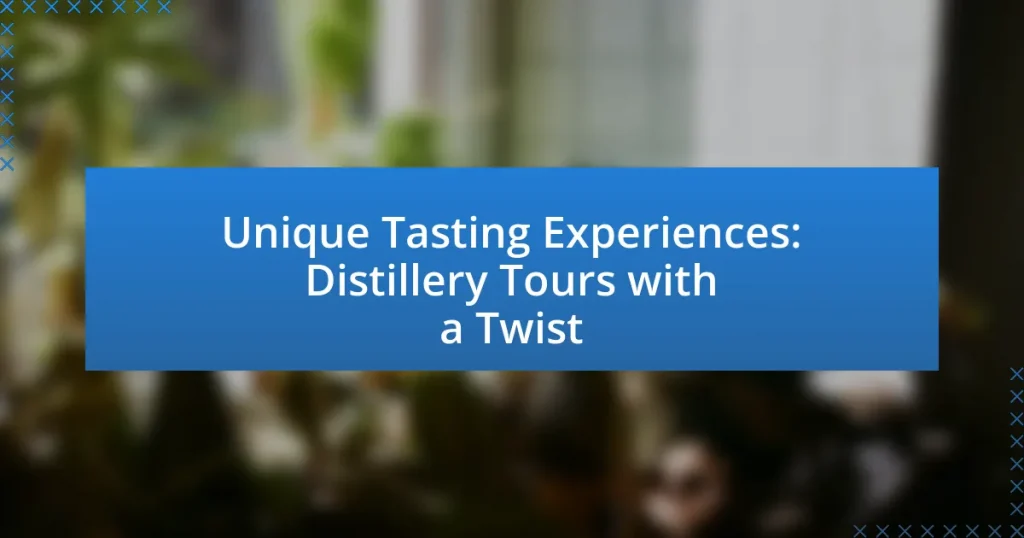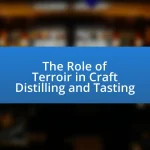Unique tasting experiences in distillery tours offer visitors an immersive exploration of the production process alongside personalized tastings of exclusive spirits. These tours often include guided sessions led by master distillers, food pairings, and interactive elements that enhance sensory engagement. Distillery tours differ from traditional tastings by providing educational insights into the craftsmanship behind the spirits, while trends such as the demand for authenticity and experiential learning drive their growing popularity. Local culture and ingredients play a significant role in shaping the tasting experience, making each tour unique and memorable.
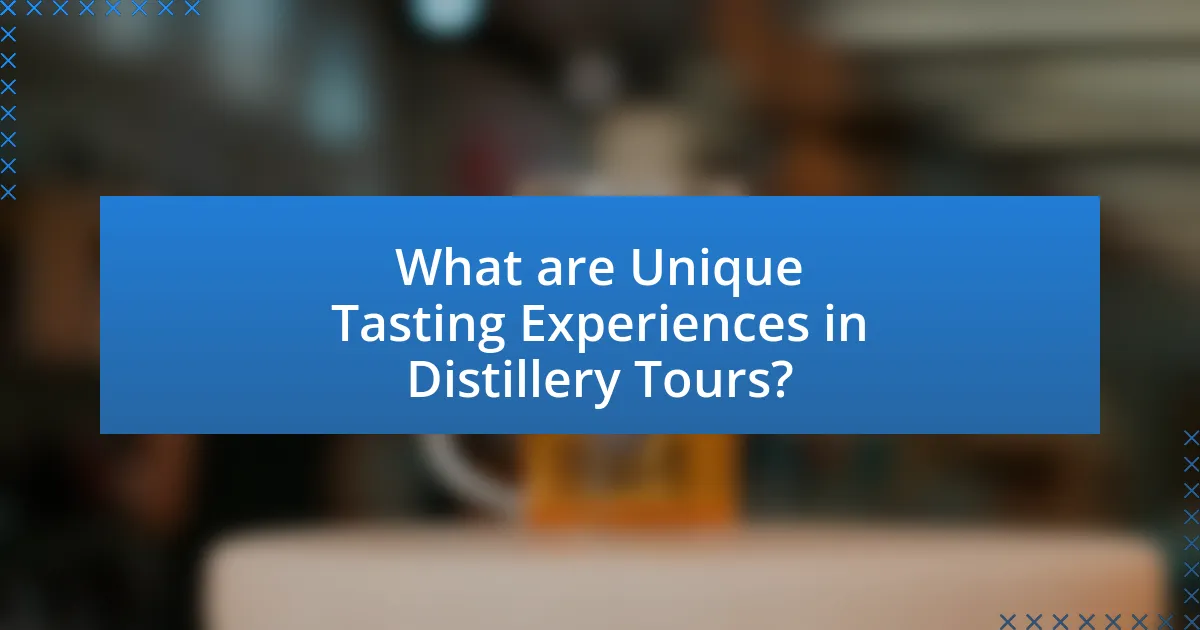
What are Unique Tasting Experiences in Distillery Tours?
Unique tasting experiences in distillery tours include personalized tastings, where visitors sample exclusive or limited-edition spirits not available to the general public. These experiences often feature guided tastings led by master distillers or knowledgeable staff who provide insights into the production process and flavor profiles. Additionally, some distilleries offer food pairings, where specific spirits are matched with gourmet dishes to enhance the tasting experience. For example, a whiskey distillery might pair its products with artisanal cheeses or chocolates, creating a multi-sensory experience that highlights the nuances of each spirit. These unique offerings not only educate visitors but also create memorable interactions with the distillery’s products.
How do Distillery Tours differ from traditional tasting experiences?
Distillery tours differ from traditional tasting experiences primarily by offering an immersive exploration of the production process alongside tastings. During a distillery tour, participants typically engage in guided visits through the facilities, learning about the ingredients, equipment, and techniques used in crafting spirits, which enhances their understanding and appreciation of the products. In contrast, traditional tasting experiences often focus solely on sampling the beverages without the educational component, limiting the context in which the flavors are understood. This distinction is significant as it allows visitors to connect the sensory experience of tasting with the craftsmanship behind the spirits, enriching their overall experience.
What elements make a distillery tour unique?
A distillery tour is unique due to its combination of craftsmanship, sensory engagement, and educational experiences. The craftsmanship involves the specific techniques and ingredients used in the distillation process, which can vary significantly between distilleries, showcasing regional characteristics and traditions. Sensory engagement is heightened through tastings that allow visitors to experience the flavors and aromas of the spirits produced, often paired with food or other local products to enhance the tasting experience. Educational experiences are provided through guided tours that explain the history, production methods, and the science behind distillation, often featuring behind-the-scenes access to the distillation equipment and aging facilities. These elements collectively create a memorable and immersive experience that distinguishes one distillery tour from another.
How do sensory experiences enhance the tasting process?
Sensory experiences significantly enhance the tasting process by engaging multiple senses, which contributes to a more comprehensive flavor perception. When tasting, the combination of sight, smell, taste, touch, and even sound creates a richer experience; for instance, the aroma of a spirit can influence its perceived flavor, as studies show that up to 80% of taste is derived from smell. This multisensory engagement allows individuals to identify subtle notes and complexities in the beverage, leading to a deeper appreciation and enjoyment of the tasting experience.
Why are Distillery Tours gaining popularity?
Distillery tours are gaining popularity due to the increasing consumer interest in craft beverages and experiential learning. As more individuals seek unique and immersive experiences, distillery tours offer an opportunity to explore the production process, taste various spirits, and engage with knowledgeable staff. According to a report by the Distilled Spirits Council, the craft spirits market has seen significant growth, with sales increasing by 20% in recent years, indicating a rising demand for authentic experiences related to beverage production. This trend reflects a broader movement towards artisanal and locally sourced products, making distillery tours an appealing choice for consumers looking to deepen their appreciation for spirits.
What trends are driving interest in unique tasting experiences?
Growing interest in unique tasting experiences is driven by trends such as the rise of experiential dining, the demand for authenticity, and the influence of social media. Experiential dining emphasizes immersive and interactive food and drink experiences, allowing consumers to engage more deeply with the products. The demand for authenticity reflects a consumer preference for locally sourced and artisanal products, which enhances the uniqueness of tasting experiences. Additionally, social media platforms amplify the visibility of these experiences, encouraging sharing and creating a buzz around innovative tasting events. According to a report by the National Restaurant Association, 74% of consumers are more likely to choose a restaurant that offers unique dining experiences, highlighting the significance of these trends in shaping consumer preferences.
How do social media and marketing influence distillery tours?
Social media and marketing significantly influence distillery tours by enhancing visibility and engagement, leading to increased visitor numbers. Distilleries utilize platforms like Instagram and Facebook to showcase their unique offerings, share behind-the-scenes content, and promote special events, which can attract a broader audience. For instance, a study by the American Distilling Institute found that 70% of distilleries reported increased foot traffic due to social media promotions. Additionally, targeted marketing campaigns can create a sense of exclusivity and urgency, encouraging potential visitors to book tours. This strategic use of social media and marketing not only boosts attendance but also fosters a community around the distillery experience.
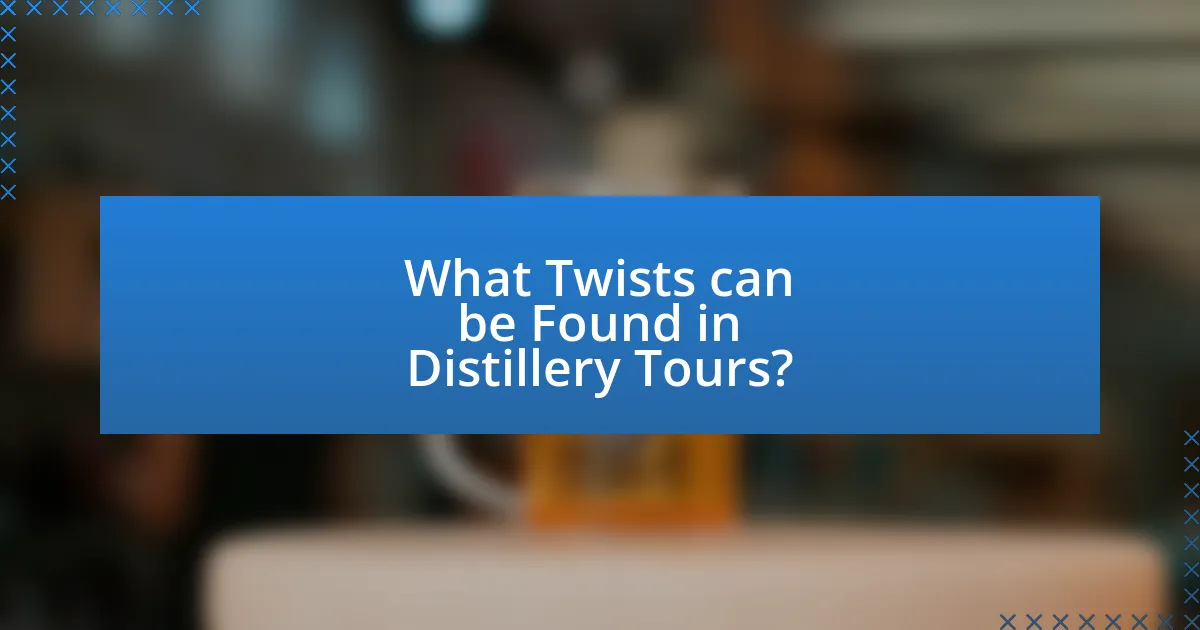
What Twists can be Found in Distillery Tours?
Distillery tours often feature unique twists such as interactive tastings, themed experiences, and behind-the-scenes access. Interactive tastings allow visitors to engage with the distillation process, often including hands-on activities like blending their own spirits. Themed experiences might focus on specific ingredients or historical contexts, enhancing the educational aspect of the tour. Behind-the-scenes access provides a rare glimpse into the production areas, showcasing equipment and techniques not typically visible to the public. These elements create memorable experiences that differentiate one distillery from another, attracting enthusiasts and casual visitors alike.
How do themed tours enhance the tasting experience?
Themed tours enhance the tasting experience by providing a curated context that deepens participants’ understanding and appreciation of the products being sampled. These tours often focus on specific themes, such as regional ingredients, historical production methods, or unique flavor profiles, which create a narrative that engages the senses and fosters a connection to the tasting items. For instance, a tour centered around local botanicals used in gin production can educate participants on the sourcing and significance of each ingredient, thereby enriching their tasting experience. This approach not only makes the tasting more memorable but also encourages participants to explore the flavors with greater curiosity and insight.
What are some examples of unique themes in distillery tours?
Unique themes in distillery tours include historical narratives, sensory experiences, and local ingredient sourcing. Historical narratives often focus on the heritage of the distillery, showcasing traditional methods and stories from the region, which can enhance visitor engagement. Sensory experiences involve interactive tastings that emphasize the aroma, flavor, and texture of spirits, allowing participants to fully immerse themselves in the tasting process. Local ingredient sourcing highlights the use of regional grains, fruits, or botanicals, connecting the distillery’s products to the local landscape and community. These themes not only enrich the tour experience but also educate visitors about the craft of distillation and the significance of local resources.
How do interactive elements contribute to the overall experience?
Interactive elements significantly enhance the overall experience by engaging participants actively, fostering a deeper connection to the content. In the context of distillery tours, these elements, such as tastings, hands-on demonstrations, and sensory activities, allow visitors to immerse themselves in the process of distillation and flavor exploration. Research indicates that experiential learning, which includes interactive participation, leads to improved retention of information and greater satisfaction among participants. For instance, a study published in the Journal of Hospitality & Tourism Research found that interactive experiences in tourism settings increase visitor enjoyment and perceived value, thereby enriching the overall experience.
What role does local culture play in distillery tours?
Local culture significantly enhances distillery tours by providing unique insights into the production process and the heritage of the spirits. Distilleries often incorporate local traditions, ingredients, and storytelling, which enrich the visitor experience and create a deeper connection to the product. For example, a distillery in Scotland may highlight its use of locally sourced barley and traditional distillation methods that have been passed down through generations, showcasing the region’s historical significance in whisky production. This cultural context not only educates visitors but also fosters appreciation for the craftsmanship involved, making the tasting experience more memorable and authentic.
How can local ingredients influence the tasting experience?
Local ingredients significantly enhance the tasting experience by providing unique flavors and aromas that reflect the region’s terroir. When distilleries use locally sourced ingredients, such as grains, fruits, or botanicals, they create products that embody the specific characteristics of the area, leading to a more authentic and memorable tasting experience. For instance, spirits made from locally grown corn may exhibit distinct sweetness and complexity, while those infused with regional herbs can offer unique aromatic profiles. This connection to the local environment not only enriches the flavor but also fosters a sense of place, allowing consumers to engage more deeply with the product and its origins.
What cultural stories are often shared during these tours?
Cultural stories shared during distillery tours often include the history of the distillation process, local legends associated with the spirits produced, and anecdotes about the founders or key figures in the distillery’s history. For instance, many tours recount the origins of specific recipes or techniques that have been passed down through generations, highlighting the craftsmanship involved. Additionally, stories may involve the impact of local culture on the flavors and styles of the spirits, such as how regional ingredients influence production. These narratives not only enhance the tasting experience but also connect visitors to the heritage and traditions of the area.
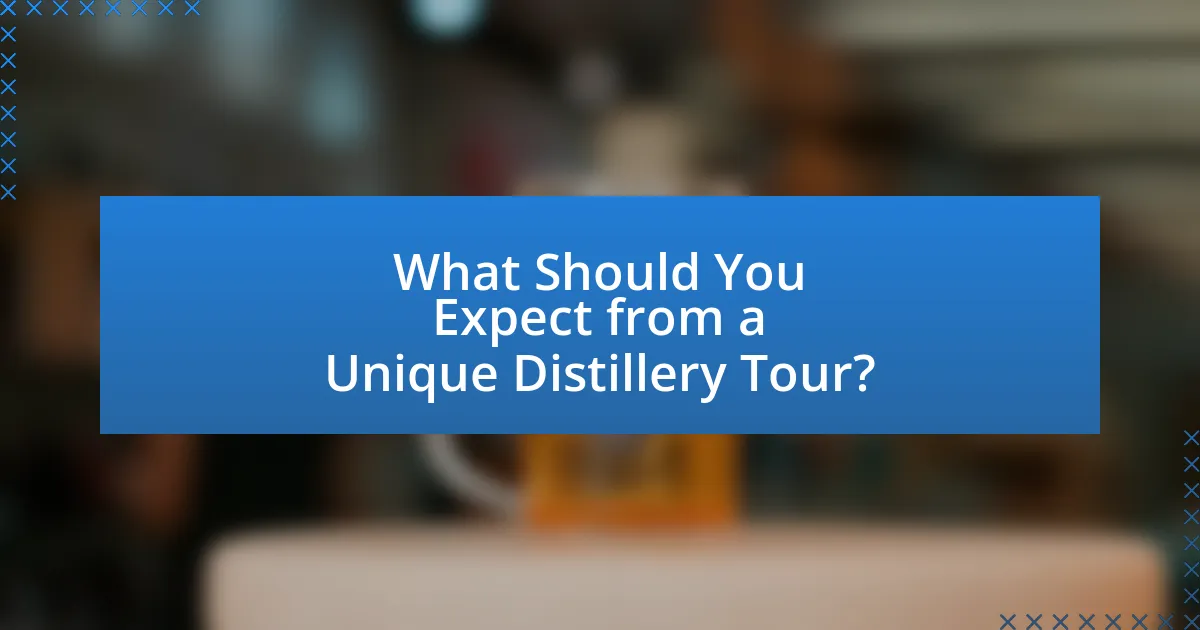
What Should You Expect from a Unique Distillery Tour?
A unique distillery tour offers an immersive experience that combines education, sensory exploration, and exclusive tastings. Visitors can expect guided tours that delve into the distillation process, showcasing the craftsmanship behind spirits like whiskey, gin, or rum. These tours often include behind-the-scenes access to production areas, allowing guests to observe the equipment and techniques used in spirit-making.
Additionally, unique distillery tours frequently feature tastings of limited-edition or small-batch products, providing an opportunity to sample flavors not available to the general public. Some tours may also incorporate interactive elements, such as blending workshops or food pairings, enhancing the overall experience. According to the Distilled Spirits Council, distillery visits have increased by over 50% in recent years, indicating a growing interest in personalized and engaging experiences in the beverage industry.
How long do unique distillery tours typically last?
Unique distillery tours typically last between one to two hours. This duration allows visitors to explore the distillation process, learn about the ingredients, and often includes tastings of the products. Many distilleries design their tours to fit within this timeframe to ensure a comprehensive yet engaging experience for guests.
What types of tastings are usually included in these tours?
Distillery tours typically include tastings of various spirits such as whiskey, gin, rum, and vodka. These tastings often feature a selection of the distillery’s signature products, allowing participants to sample different styles and flavors. Additionally, some tours may incorporate food pairings, where tastings are complemented by local cheeses, chocolates, or other culinary items that enhance the tasting experience. This approach not only showcases the distillery’s offerings but also provides a holistic sensory experience that highlights the craftsmanship behind each spirit.
What should you wear or bring to a distillery tour?
Wear comfortable, closed-toe shoes and casual clothing suitable for walking and standing during a distillery tour. Distilleries often have uneven surfaces and may involve walking through production areas, so sturdy footwear is essential for safety. Additionally, bringing a light jacket or sweater is advisable, as temperature can vary in different areas of the distillery. It is also recommended to bring a water bottle to stay hydrated, especially if the tour includes tastings.
What are the best practices for enjoying a distillery tour?
To enjoy a distillery tour, arrive on time, engage with the guide, and participate actively in tastings. Arriving punctually ensures you do not miss any part of the experience, as many distilleries have structured schedules. Engaging with the guide allows for a deeper understanding of the distillation process, the history of the distillery, and the nuances of the spirits being produced. Actively participating in tastings enhances your appreciation of the flavors and aromas, making the experience more memorable. Additionally, many distilleries offer insights into the ingredients and techniques used, which can enrich your knowledge and enjoyment of the spirits.
How can you prepare for a unique tasting experience?
To prepare for a unique tasting experience, research the distillery and its offerings in advance. Understanding the specific spirits, their production methods, and flavor profiles enhances appreciation during the tasting. For instance, knowing the difference between whiskey types, such as bourbon and Scotch, can inform your palate and expectations. Additionally, consider attending a pre-tasting workshop or seminar, which can provide insights into tasting techniques and the history of the distillery, thereby enriching the overall experience.
What etiquette should you follow during a distillery tour?
During a distillery tour, visitors should adhere to respectful behavior, which includes listening attentively to the guide, refraining from loud conversations, and asking questions at appropriate times. This etiquette ensures a pleasant experience for all participants and allows for a better understanding of the distillation process. Additionally, it is important to follow any specific rules set by the distillery, such as age restrictions for tastings and safety protocols. Following these guidelines enhances the overall experience and maintains a respectful atmosphere, which is crucial in a setting focused on craftsmanship and tradition.
What tips can enhance your distillery tour experience?
To enhance your distillery tour experience, engage actively with the guide and ask questions about the distillation process and the history of the spirits. This interaction not only deepens your understanding but also enriches your appreciation of the craft. Research indicates that participants who ask questions during tours report higher satisfaction levels, as they feel more connected to the experience. Additionally, consider participating in tastings, as sampling different spirits allows for a more comprehensive understanding of flavor profiles and production techniques. Engaging with the staff and other visitors can also lead to shared insights and recommendations, further enhancing the overall experience.
